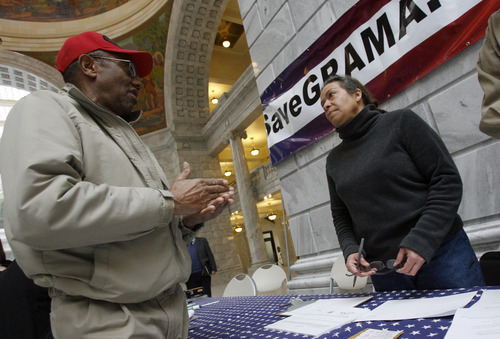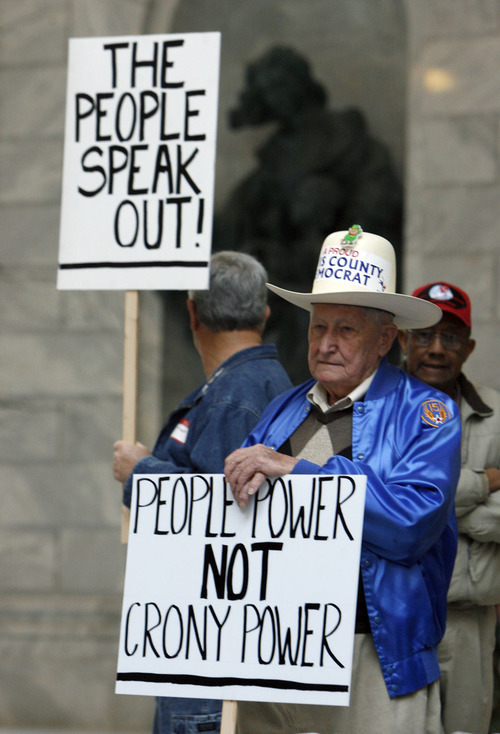This is an archived article that was published on sltrib.com in 2011, and information in the article may be outdated. It is provided only for personal research purposes and may not be reprinted.
Outrage over a law restricting public access to government records reached across the political spectrum Thursday, uniting liberal former Salt Lake City Mayor Rocky Anderson and tea-party organizer David Kirkham in working for its repeal.
"[HB]477 casts a shadow over our laws. [HB]477 diminishes our liberty," Kirkham said. "We, the people, have a right to know what our government is doing. We, the people, have a right to see it in the sunshine and see it in the daylight."
Anderson and Kirkham were among the leaders of a rally to begin the daunting process of gathering about 97,000 signatures around the state in the next 30 days to repeal the records law.
But they and others said that, ultimately, the lawmakers who passed the legislation are the ones who should be held accountable.
"These people will pay the ultimate political price in our democracy," Anderson said. "We need to defeat them the next time around and elect people who will not betray the public."
HB477 was made public and passed the Legislature in just three days, but Gov. Gary Herbert balked at the bill, negotiated a change and signed it with its implementation delayed until July 1. In the meantime, a task force will discuss the issue, and changes may be made during a special session in June.
If it isn't changed, the law will exempt text messages, instant messages and video chats from public-records laws; will require a person filing a request to pay attorneys' fees; and will wipe out a presumption that government records should be public.
"It all reflects a disdain for all of us and clueless arrogance that, somehow, once again, our elected officials are a privileged class, not answerable to the people," Anderson said. "And, here in Utah, their cynical calculation is that because this is a one-party state with a monopoly on political power, they can do as they please."
Kirkham said he and other tea-party supporters are most offended by the fees HB477 would charge, which would most directly hurt citizens, especially the poor, who would be forced to come up with attorneys' fees to find out what their government is doing.
"It was shoved through in the dead of night," said Kirkham, who also criticized the governor for signing the bill, claiming it could be fixed later. "Has our government really deteriorated to such a state that this is what we've come to?"
Representatives from the American Civil Liberties Union, Common Cause, Utahns for Ethical Government, Utah Moms for Clean Air and several individuals and former elected officials also blasted the new law.
In an e-mail to House members on Thursday, House Speaker Becky Lockhart defended the changes, argued that the Government Records Access Management Act (GRAMA) needs to be revisited and a process is now in place to address issues.
She said the law hasn't kept pace with technology, requests have become burdensome and costly to taxpayers and Utah government is already transparent enough.
Lockhart said she plans to appoint members to the GRAMA task force within a few days, and meetings should begin next week.
On Wednesday, Rep. Carl Wimmer, R-Herriman, who initially voted for HB477, publicly called on the governor to convene a special session so the Legislature can repeal the measure, which he said is counter to the principles of good government.
Rep. Kraig Powell, R-Heber City, said earlier this week that he felt pressured to vote for the bill and — although there was no explicit threat — he was concerned his measures would be killed by leadership if he voted against it.
In all, 15 Republicans and two Democrats in the House who initially voted for HB477 voted against the bill when it was brought back to the body to be reconsidered.
"These are dark days for democracy in the state of Utah," said Rep. Joel Briscoe, D-Salt Lake City, who opposed the bill. "These laws strike at the heart of the First Amendment."
Because of changes to the referendum process that passed as part of SB165, opponents of HB477 have a high threshold to meet if they are going to get it repealed. They can't use electronic signatures and have to gather 97,000 signatures — an increase from 65,000 — from registered voters across the state in a little more than 30 days.
"GRAMA has angry children," said Steve Maxfield, an organizer of the referendum drive. "We're mad as hell, and we're not going to take it anymore."
Referendum
A citizen-led effort to repeal a law requires gathering 97,000 signatures (under a new law, SB165) of registered voters from at least 15 of the state's 29 counties. There is a window of just 40 days from the March 10 end of the legislative session. If the requirements are met, the referendum question would appear on the 2012 general-election ballot. The referendum website for the HB477 repeal is http://savegrama.org







